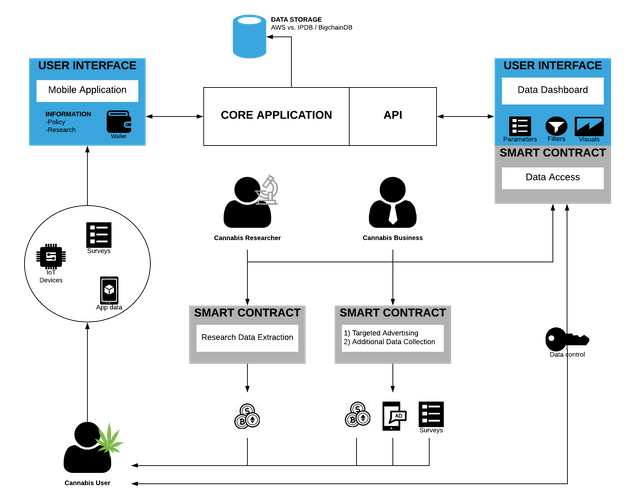Selling Blockchain to the City of Edmonton - 2nd Place at the SmartCities HealthHack
Joe Dang and myself were finalists in the Edmonton Smart Cities HealthHack recently. Our idea and prototype was for a blockchain-based consumer mobile application focused on cannabis use and information. Although many eyebrows have been raised at what some would call “an overuse of buzzwords”, these topics are buzzwords for a reason, and a lot of thought has been put into our system.
We were moderately successful at selling this idea to the City of Edmonton Health Hack judges, receiving the second place title and $2500.
Our idea is about leveraging blockchain to create a cryptocurrency incentived open data gathering and distributing platform, coupled to an informational app.
Why is such a system needed? Canada is set to legalize recreational cannabis in 2018. Over 40% of the population reports cannabis use, and this may increase post-legalization. However; the health effects of cannabis consumption are largely unknown, (only indicated in select conditions — palliative pain, chemotherapy-induced nausea) and studies have shown functional status is worse amongst marijuana users. Despite anecdotal disregard, cannabis will be a factor in impaired driving, and roadside testing is far from established (cannabis has a longer half life than alcohol, and can reside and move about the body in different ways than alcohol).
More research is needed and lacking, but we certainly don’t want to repeat the mistakes made with early nicotine and smoking research, funded and influenced by industry money. Blockchain provides a potential solution to this issue. A high level diagram of stakeholders and systems in our solution is show below.
We propose an informational mobile application, with up to date info for Canadians on cannabis research,common misconceptions and indications, and rapidly changing policies. More importantly, it would prompt users to complete ongoing surveys regarding important topics of cannabis research, and establish longitudinal data collection, with the potential to collect IoT health data as well through device integrations with fitbits and other mobile applications. Cognitive impairment measurement tools such as DRUID would also be available from within the app (as a self-measurement utility and to provide data for further validation and study).
Many of these behaviors would be rewarded with a cryptocurrency (ERC20 or otherwise — to be determined), and so the app would function also as a wallet. Where would the value behind the cryptocurrency and the funding to provide this reward come from?
The other parties in this system would be researchers and cannabis businesses. Researchers would be able to purchase full datasets from the massive data collected by the app. They would be able to filter down via a web dashboard, depending on which variables they need to answer their research question. If they need more data after filtering, they can pay to send questionnaires or other requests to individual users. Upon purchasing a dataset, the individual users whose data contributed to the set, would be compensated through their wallet address. Did I mention this would still be done without collecting users’ personal information, a common concern with research studies? That is the beauty of blockchain.
Cannabis businesses would also be able to filter down (they may be looking for things like user / consumer preferences and location). However; instead of sending requests for data, they would be able to send advertisements to users (only if the user opted in). They would pay for these ads, however instead of a company collecting this payment, the payment would go to the user being advertised to. This is not unlike the Earn.com model. But it is even more valuable, because cannabis advertising is not allowed on platforms like facebook or google, by virtue of its illicit status. Of course, these regulations are subject to change still, and something to be considered as this platform and model is further developed.
Of course, outside of these specific data uses, which will be monetized (but not commercially, instead providing value directly to the users), the data will all be available at an aggregate level to inform the public, similar to administrative dashboards like Alberta Health:
The blockchain is being investigated for its potential in medical research already. It allows data to be stored publicly and immutably, and especially allows the auditing of data and data transfer, which is an overlooked and operationally intensive occurrence in medical research. Greater transparency and reproducibility of studies is now possible, while maintaining patient/user privacy.
In addition, we think our proposed solution would lead to a more informed, healthier, and safer community. There is infinite potential for IoT and blockchain-based integrations, with the potential for point-of-care interventions that could prevent behaviors such as impaired driving. China and Dubai are already leveraging blockchain in their IoT Smart City initiatives and it is our hope that Edmonton and Canada will follow suit.
We are open to anyone looking to collaborate with us in the blockchain or cannabis space. We also invite anyone out there to critique this idea, on a high level, or on a technical level.
.jpg)
